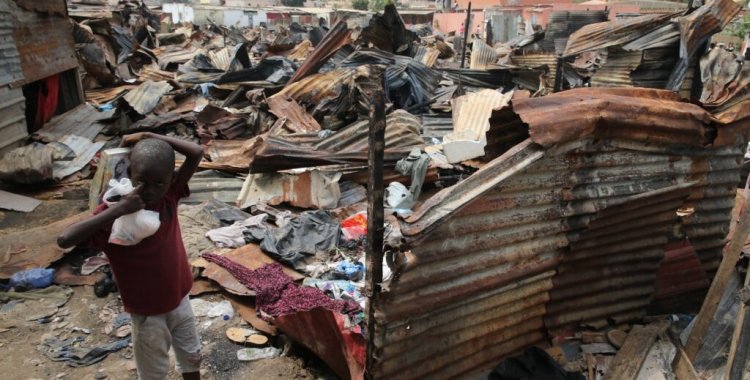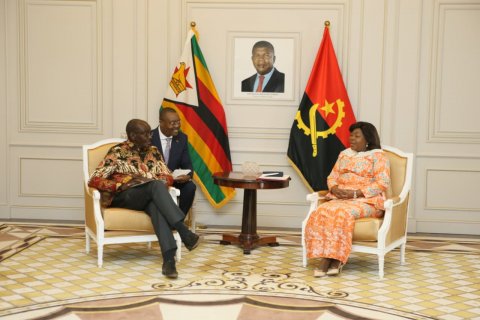The topic addressed was proposed by the parliamentary groups of the Popular Movement for the Liberation of Angola (MPLA) and the National Union for the Total Independence of Angola (UNITA).
The background report on the subject considers essential the design and structuring of a real land policy for the correct ordering and management of the territory, providing the supply of land necessary to cover the needs of the populations.
The National Assembly must exercise "an active role in supervising the activity of the executive and public administration in general, within the scope of planning and management of the territory at the national level, through parliamentary hearings or other control mechanisms set out in the law for this purpose, says the document.
UNITA deputy Irina Ferreira considered "necessary and crucial" greater reflection on the demolitions carried out by municipal administrations, which bring "chaos and pain to families".
"Why do the authorities allow the population to build their houses first, let them live in them, and then destroy them? The population must be heard and their needs must be considered", advocated the deputy.
MPLA deputy Carla de Sousa noted that the matter is current, stressing that mainly the capital, Luanda, is registering an increase in population and "disorganized and disqualified development", with "an explosion in the growth of precarious housing areas".
Carla de Sousa defended, among several proposals, raising awareness to discourage practices of illegal occupation of land and anarchic constructions, to mitigate "the vein of active corruption that sometimes instigates people and groups in bad faith".
In turn, MPLA deputy Nazário Vilhena questioned whether, with the emergence of neighborhoods "overnight" mainly "in an environment of peace", that is, in the last 20 years, one is not in the presence of "a macabre plan destabilization of territorial management and destabilization of administrative services or even an affront to the heavy hand of the State and the law".
Nazário Vilhena stressed that the State often, on the basis of a set of policies and programs aimed at the social, economic and cultural well-being of families, "when necessary, does not exonerate itself from its responsibilities to impose order, as a determining factor of guarantor of the dignity of human life" that can lead to demolitions.
Near the end of the debate, which had seven interventions, tempers flared, with accusations being exchanged between deputies from the two largest parliamentary groups, when deputy Milonga Bernardo (MPLA) questioned his opposition colleagues about the opposition of their position when they criticize the government for providing housing for citizens.
"Are they the same ones who, on the contrary, allude that the State should not allocate residences to young people allegedly for conscience buying", he ironized.
Soon afterwards, deputy Ariane Nhany, from UNITA, corrected her colleague by saying that "houses are not allocated to young people", because "these young people pay for those houses".
"I present myself now at this plenary with the meaning that, if this parliamentary group does not address this issue, no group will do so under penalty of being called attention, because here they do not represent the interests of the citizens but the their own interests, which is nothing new for any of us," he said.
The intervention of deputy Esteves Hilário, from the MPLA, further intensified the exchange of pleasantries between the two parliamentary benches by criticizing colleagues for not presenting solutions in their interventions.
"When I learned that UNITA had proposed the topic for this debate, in my naivety, perhaps in my critical optimism as a Christian, I believed that UNITA had done its homework, I came to believe that UNITA had gathered its Council of Ministers in the shadows to discuss the issue and bring solutions, unfortunately, UNITA came just like itself, brought two hands full of nothing, accusations and only accusations", he pointed out.
According to Esteves Hilário, problems of management and general disorder in cities have "political patronage, when political forces ally themselves with vandalism and want to make it the 'modus vivendi'".
UNITA deputy Silvestre Samy denied the accusation that they went to the debate "empty-handed".
Continuing his speech, Esteves Hilário defended that "it is necessary that the Angolan parliament has the capacity to act both in its form, in its legislative competences, and in its competences of supervising the action of the executive and the civil service".
The deputy said that he was waiting for UNITA to present concrete proposals, for example, on amending the Land Law, and was once again interrupted by UNITA deputy, Albertina Ngolo, to say that he understood in the criticism of his colleagues a way to say "that deputies should turn a blind eye to the demolitions of citizens' homes".







